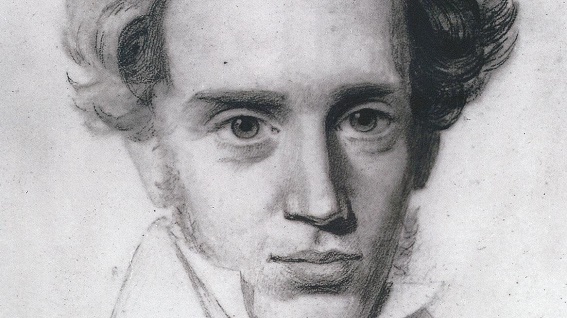S. Kierkegaard’s teaching on Sin and Desperation
29 June 2015[Previous publication:http://bit.ly/1LLgW3x]
Afterwards Kierkegaard analyses the different kinds of being desperate, which would always be visible by observing the self-relation towards the two qualities of eternity and finitude or analogue to it: soul and body and opportunity and necessity. Being desperate because of living just in eternity for example means to deny ones finitude. By that one disagrees with God as his Creator. Kierkegaard describes this type as someone, who exists just by reflecting himself, but not by actually acting and being connected to the world. In contrast he describes one, who is desperate because of its lack of eternity. This one rejects his eternal part by determining his self to the world and the community he is living in. Kierkegaard shows a character, who is fully dependent on rules which are made by others. By doing so, he ignores his own self and his freedom of taking own decisions.[41]

After that, Kierkegaard analyses desperation under the perspective of consciousness. According to him being more conscious increases the level of desperation, because one is conscious about its own desperation, which is even worse than being purely desperate. Only those who are totally living in sensuality aren’t be conscious about their own desperation.[42] Desperately don’t want to be one self means to be orientated totally on the finitude, just as the one who is desperate because of his lack of eternity. As soon as something bad from the outside happens to him, this type would be desperate, because of not having an idea of having an eternal self, which continues throughout everything worldly and which is connected by God as its Creator.[43] The one who desperately wants to be his self tries to deny being limited by living just in eternity. By that he tries to overtake the divine eternity. This attempt what must fail, because men is not just living in eternity, but he belongs to the world as well.[44]
In the second chapter Kierkegaard characterizes desperation as sin upon the perspective of God. Putting desperation in relation to God, it is a voluntary action against him, since he is the Creator of men. Whereas desperation is orientated on human norms, concerning to God it`s sin. Besides of that perspective sin can be contently be described in the same way as desperation was characterized. Sin is though something ever moving, which can`t be described by objective facts or conditions. Since desperation is a consequence of a wrong self-relation towards the basic combination of eternity and finitude and therefore an expression of human freedom, also sin is something which has to do with will and not with knowledge. Kierkegaard declares this fact by discussing Sokrates understanding of sin. He argues, that Sokrates missed to distinguish between knowledge and will, by simply indicating that sin is a consequence of unknown. Kierkegaard in contrast argues, that sin is something which is located in the human will, because even when the knowledge is right, one could act sinfully. Just after a divine revelation, ones will could be changed into a good one, which could just happen by believing, not by thinking.[45]
Concerning to Kierkegaard, sin continues as long as not every former sin is regretted, because it is something which is located in eternity. The state of sin is increasing by being desperate about it. This means to be conscious about one`s own sin, through out what one would be disconnected from God in two time: First by being sinful and second by not accepting his offer of salvation. Furthermore Kierkegaard describes a sin, which consists of being desperate of the salvation by Jesus Christ, by what he introduces an Christological perspective. He also calls that kind of desperation as an offence towards the fact, that God paradoxically became men. This paradoxical fact could be accepted just by believing, because reason ever need to be destroyed by it.[46] With that Kierkegaard comes to his final definition of faith: Just the one, who dares to make the leap of faith into the paradoxical existence of men and who accepts God as his Creator, can be redeemed.
[To Be Continued]
[41] See Kierkegaard, Krankheit, p. 32-38.
[42] See ibid. p. 47-55.
[43] See ibid. p. 56-71.
[44] See ibid. p. 72.
[45] See ibid. p. 99-114.
[46] See Kierkegaard, Krankheit, p. 125-142.






